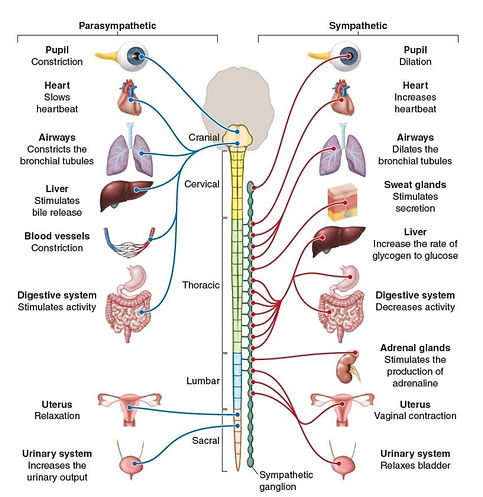
Stress
Stress is our (unconscious) survival mechanism, designed to keep us safe in situations where we perceive threats or danger. This stress mechanism is a valuable tool, as it helps us perform in situations where it is needed.

The autonomic nervous system
Stress is regulated by the Autonomic Nervous System (ANS). The ANS controls involuntary body functions and has two parts; the sympathetic and parasympathetic system.
The sympathetic system prepares the body for stressful or dangerous situations, triggering the "fight or flight" response. It a.o. increases heart rate, speeds up breath, dilates pupils, and slows digestion to direct energy to muscles.
In contrast, the parasympathetic system promotes relaxation and recovery, known as the "rest and digest" response. It slows the heart rate, constricts pupils, and stimulates digestion. Together, these systems maintain balance by activating the body in response to stress and calming it down and recover when the stressor is gone.
A stress system in balance:
The 3 Stress zones
When we maintain a healthy balance between stress and recovery in our lives, we function in our Green Zone. In this state, we are relaxed, easily connect with others, exhibit empathy, and our brains operate at their most effective level. In short, we are in our zone of flourishing. If we encounter a stressful situation, our body will activate (fight or flight) to perform or survive the threat and recover again after the event to stay in our Green zone.


Stress system out of balance:
the 3 stress zones
However, when we experience too much stress for too long and have insufficient recovery, we stay in our Red Zone, or survival mode. In this state, we feel more easily threatened, react more emotionally, our brain functions less effectively, and we have less capacity for the well-being of the people around us. We feel rushed and restless, and because our brains are constantly in a state of alertness, we are more likely to perceive situations as threats or dangers. If we stay in our Red Zone for an extended period, there is a risk of developing physical and/or mental health issues due to exhausting our system.
If we experience something so threatening that it overwhelms our system's capacity to cope, we enter our Black Zone, or the 'Freeze' state. This can also happen if we remain in our Red Zone for too long and our system becomes depleted.
Stress Management
-Measuring your stress balance-
I measure the activation of your sympathetic and parasympathetic systems to gain insight into the balance of your stress and recovery, the amount of stress you experience and what causes your stress.
This is the foundation for finding the tools, habits, and methods that will help you to relax, so you can restore the balance between stress and recovery and increase your stress resilience.

